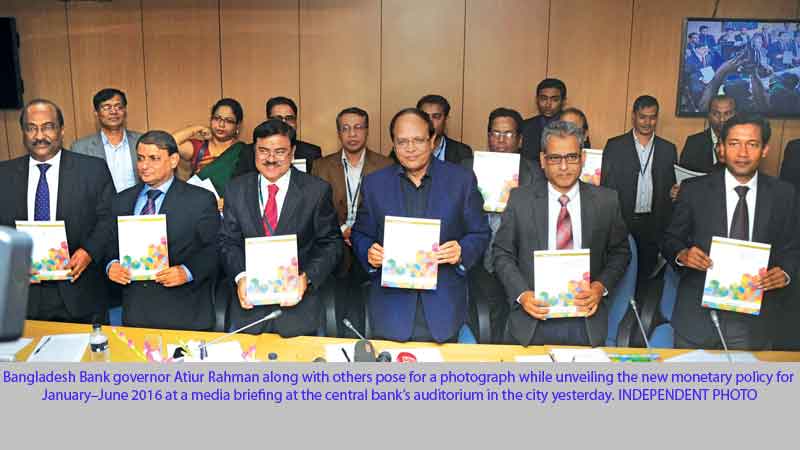BB monetary policy to boost domestic demand
Central bank targets 7pc GDP growth
 The Bangladesh Bank (BB) announced the second half-yearly monetary policy, placing its main thrust on boosting domestic demand for achieving the government’s target of 7 per cent growth in gross domestic product (GDP).
The Bangladesh Bank (BB) announced the second half-yearly monetary policy, placing its main thrust on boosting domestic demand for achieving the government’s target of 7 per cent growth in gross domestic product (GDP).
“Our earlier engine was exports. Now, domestic demand has been added to it as a new engine for achieving the target,” said Bangladesh Bank governor Dr Atiur Rahman, while unveiling the new monetary policy for January–June 2016 at a media briefing at the central bank’s auditorium in the city yesterday.
“This is an investment-stimulating monetary policy, which will focus on quality credit expansion through an inclusive approach,” the bank said, adding, “Selective easing for agricultural and other productive sectors will draw enhanced attention.”
Rahman said recent economic indicators point towards a solid growth momentum in FY2016: exports are picking up despite the challenging external environment; capital machinery imports grew robustly in recent months; private sector credit growth rose to 13.7 per cent in November, up from 13.2 per cent during the last monetary policy in June, supplemented by strong private sector external borrowings.
“Interest rates have declined, with spreads now at less than 5 per cent,” the central bank’s governor said.
Banks are being encouraged to further bring down the spreads. Incorporating both the domestic and external developments, the BB has projected FY2016 growth at 6.8–6.9 per cent and inflation at 6.1 per cent in June 2016, Rahman said, adding: “With continued political stability, growth could reach 7 per cent.” “We need to upgrade our export performance through higher productivity, investment, and diversification. But that may not be enough. We can—and should—add another strong engine to our export-led growth model,” he said.
“That engine is our domestic demand, which, fortunately, can leverage our demographics, tech-savvy youth, market size, and population density. Our growth will then be even more robust, fuelled by two engines—exports and domestic demand,” he added.
“For these two engines, especially domestic demand, to function properly, the financial system has to play a critical role: ensuring that national savings rise and are then channelled into their most productive and equitable usage, not to the privileged bidders. It is not only higher, but also more productive investment that we are after. This will also require further deepening of our financial system,” he also said.
“The BB remains committed to serving the savers and the borrowers through better regulation, supervision, policy innovation, and market development,” he added.
“The BB places strong emphasis on improving governance and supervision to achieve higher financial intermediation efficiency. The recent BB appointments of bank observers reflects that priority,” the BB governor said.
“Our prudent monetary policy and regulatory support are designed to foster a sustainable development of capital markets. We are also working on issuing green bonds to nudge our financial system to serve our environment,” he added.
The new monetary policy is projected to grow at 15.0 per cent in June 2016 from 14.2 per cent in December 2015. The policy is adequate to support the growth and inflation targets. It has also taken the growth rates of both public and private credit into account.
Domestic credit is projected to grow at 15.5 per cent at the end of the fiscal year 2016 from 10.9 per cent in December 2015. Private sector credit is projected to grow at 14.8 per cent in June 2016 from 13.8 per cent in December 2015. Public sector credit is expected to grow at 18.7 per cent from a negative figure of 1.7 per cent in December 2015. The new policy also said inflation is expected to come down to 6.07 per cent in June 2016 from 6.20 per cent in December 2015. Some effects of pay rise in the government sector are likely to be cancelled out by the dampening fuel and commodity prices.
After keeping a static set of policy rates—repo and reverse repo rates—for a while, the Bangladesh Bank has now decided to lower the repo rate and reverse repo rate by 50 basis points, sending the repo to 6.75 per cent and reverse repo to 4.75 per cent from the current rates. This move will attempt to dampen other interest rates in the market and help stimulate investments. Market alignments that are necessary have warranted this change, the new policy explained.
The falling fuel and commodity prices have globally created a low-inflation environment, paving the way for a considerable reduction in policy rates, thereby signalling the market to raise investments when macro stability is commendable.
The BB has also made a strategic shift in its loan disbursement policy. All banks will be encouraged to substantially increase advances to micro, small, and medium enterprises. The BB's bank’s supervisory vigilance on banking governance will be further strengthened to clamp down on loan delinquencies.
The policy noted that as before, the BB's monetary and financial policy stance remains grounded in the mandate of developmental central banking, which is enshrined in its charter.




Comments